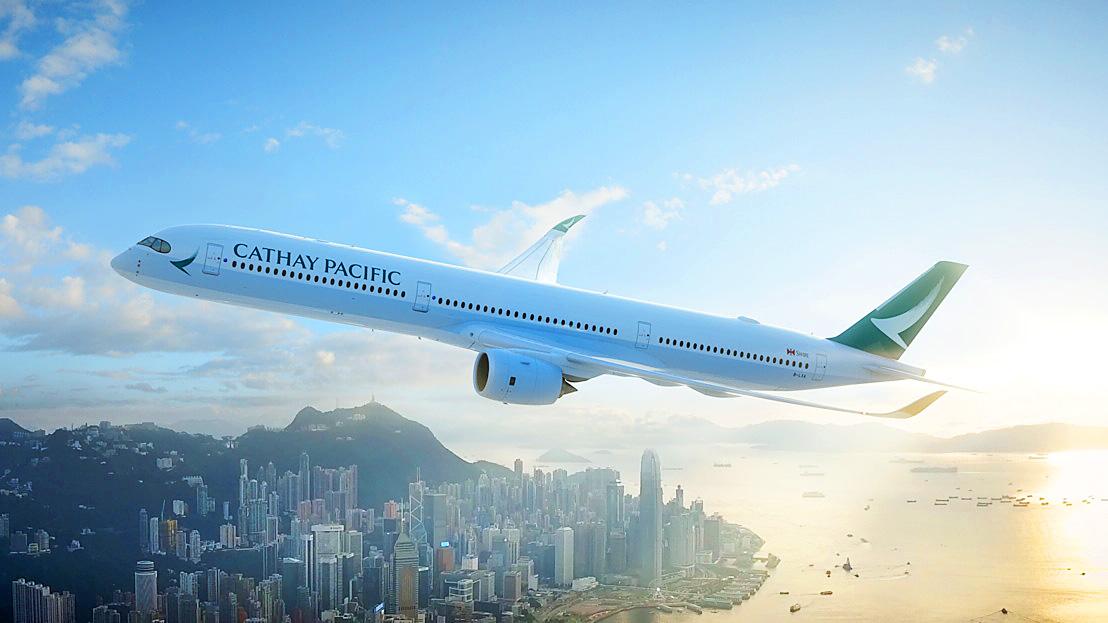Cathay Pacific Airways yesterday announced that it would resume services to southern Taiwan by offering two flights from Kaohsiung to Hong Kong this month, starting on Saturday next week.
The airline’s subsidiary Cathay Dragon operated the Kaohsiung-Hong Kong route, but suspended services on Feb. 13 due to the COVID-19 pandemic.
The subsidiary ceased operations on Oct. 21.

Photo courtesy of Cathay Pacific Airways
Cathay Pacific said that the resumption shows its unwavering commitment to serving passengers in southern Taiwan.
It is to use an Airbus 330-300 aircraft for the two flights, with the first one leaving on Saturday next week and the second one on Nov. 28.
The plane is to depart Hong Kong at 8:50am and arrive in Kaohsiung at 10:20am, and then leave Kaohsiung at 11:20am and arrive in Hong Kong at 12:55pm, it said.
Schedules for the Kaohsiung-Hong Kong flights in the next few months would be arranged based on market demand, it said.
Cathay Pacific currently offers four flights per week to Hong Kong from the Taiwan Taoyuan International Airport.
In related news, United Airlines said earlier this week that from Dec. 5, it would increase its flights to San Francisco from Taipei from three to five.
The Chicago-based airline resumed Taipei-San Francisco flights on Tuesday last week after having suspended the service for about seven months.
Under the new flight schedule, flights to San Francisco would leave from Taipei on Tuesdays, Wednesdays, Fridays, Saturdays and Sundays.
From San Francisco, flights to Taipei would depart on Mondays Wednesdays, Thursdays, Fridays and Sundays.
The increased services show that there is steady and reliable demand for passenger and cargo services between Taipei and San Francisco, United Airlines managing director for greater China and Korea Walter Dias said in a statement.
The airline will continue to explore growth opportunities and facilitate air services between Taiwan and the US, Dias added.
In other developments, there are a few conditions that need to be met before Boeing 737 Max 8 aircraft could be allowed to land at the nation’s airports or fly through the nation’s airspace, a source familiar with the process said.
Taiwan in March last year joined other nations around the world in suspending all commercial operations of the Boeing 737 Max aircraft following an Indonesian Lion Air crash in October 2018 and an Ethiopian Airlines crash last year.
No Taiwanese airlines own Boeing 737-MAX 8 aircraft.
Media reports said that the US Federal Aviation Administration (FAA) could announce safety certification of the grounded jetliner as soon as Wednesday next week, and that the agency is to approve new training for pilots and set new maintenance requirements to ensure the planes can return to service.
“Boeing must state what changes it has made to address safety issues that have been identified and convince airlines as well as aviation authorities around the world that such issues no longer exist,” the source said, adding that Boeing and the FAA have yet to release relevant information about the corrective measures.
The government would only consider evaluating if it should allow the aircraft to operate in Taiwan after it has reviewed and accepted the data, the source said.

Actor Darren Wang (王大陸) was questioned by prosecutors for allegedly orchestrating an attack on a taxi driver after he was allegedly driven on a longer than necessary route in a car he disliked. The questioning at the New Taipei City District Prosecutors’ Office was ongoing as of press time last night. Police have recommended charges of attempted murder. The legally embattled actor — known for his role in the coming-of-age film Our Times (我的少女時代) — is under a separate investigation for allegedly using fake medical documents to evade mandatory military service. According to local media reports, police said Wang earlier last year ordered a

CAUTION: Based on intelligence from the nation’s security agencies, MOFA has cautioned Taiwanese travelers about heightened safety risks in China-friendly countries The Ministry of Foreign Affairs (MOFA) yesterday urged Taiwanese to be aware of their safety when traveling abroad, especially in countries that are friendly to China. China in June last year issued 22 guidelines that allow its courts to try in absentia and sentence to death so-called “diehard” Taiwanese independence activists, even though Chinese courts have no jurisdiction in Taiwan. Late last month, a senior Chinese official gave closed-door instructions to state security units to implement the guidelines in countries friendly to China, a government memo and a senior Taiwan security official said, based on information gathered by Taiwan’s intelligence agency. The

Taiwan Semiconductor Manufacturing Co (TSMC), the world’s largest contract chipmaker, said yesterday that it is looking to hire 8,000 people this year, at a time when the tech giant is expanding production capacity to maintain its lead over competitors. To attract talent, TSMC would launch a large-scale recruitment campaign on campuses across Taiwan, where a newly recruited engineer with a master’s degree could expect to receive an average salary of NT$2.2 million (US$60,912), which is much higher than the 2023 national average of NT$709,000 for those in the same category, according to government statistics. TSMC, which accounted for more than 60 percent

President William Lai (賴清德) should protect Taiwan Semiconductor Manufacturing Co (TSMC), and stop supporting domestic strife and discord, former president Ma Ying-jeou (馬英九) wrote on Facebook yesterday. US President Donald Trump and TSMC on Monday jointly announced that the company would invest an additional US$100 billion over the next few years to expand its semiconductor manufacturing operations in the US. The TSMC plans have promoted concern in Taiwan that it would effectively lead to the chipmaking giant becoming Americanized. The Lai administration lacks tangible policies to address concerns that Taiwan might follow in Ukraine’s footsteps, Ma wrote. Instead, it seems to think it could